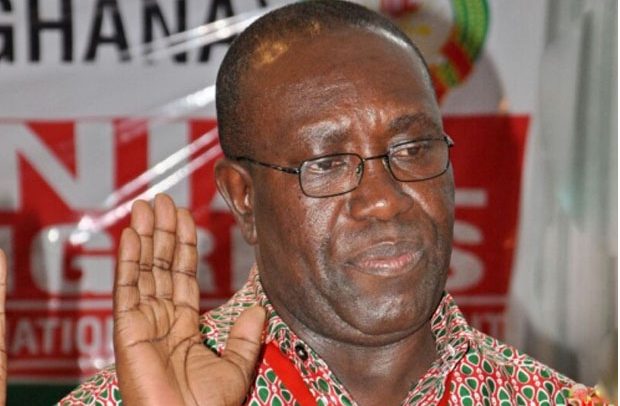Dr Anthony Yaw Baah, General Secretary, TUC
THE GHANA Trades Union Congress (TUC) has given thumbs-up to government’s macroeconomic management, the remarkable growth in industry and the successful banking sector cleanup, among others; saying an area that needs special attention is the management of the Cedi exchange rate.
The TUC, which was reacting to the 2020 mid-year budget review presented to Parliament recently by Finance Minister, Ken Ofori-Atta, was happy that at the end of the first quarter overall GDP had grown by over 6.7 per cent; inflation had dropped further to 9.1 per cent; overall budget balance was -3.3 per cent; and gross international reserves had increased to 4.3 months of imports of goods and services.
However, it emphasised, “An area that needs special attention is the management of exchange rate of the Cedi in terms of the major international currencies. The cumulative depreciation of the Cedi by 8.4 per cent against the US dollar between June 2018 and June 2019 was too high. A more prudent management of the exchange rate is important not only because it affects the price of imports of essential commodities such as medicines and food but it also impacts adversely on payment of interests on our huge foreign debt in terms of revaluation losses.”
High Lending Rate
Though it commended the falling interest rates, it wondered why lending rates were still hovering around 28 per cent.
“We are told that private sector credit expanded by 16.8 per cent at the end of June 2019 but this was achieved at a high cost to the private sector. The relatively high cost of capital in Ghana compared to our trading partners makes our private sector less competitive and significantly reduces the ability of private sector firms to pay back loans, hence the high rate of Non-Performing Loans (NPL) facing our banks. Until we manage to bring lending rates down to reasonable levels, our quest for industrialization and private sector development will continue to elude us,” it said.
Employment Creation
On this, it noted, “We need an Akufo-Addo Plan similar to the Marshall Plan in order to make a significant impact on the employment situation in the country. This requires that all development efforts, policies and programmes must focus on job creation.”
Tax Exemptions
“Why should we allow tax exemptions to deprive us of much needed revenue for development? We urge the government to take all necessary measures to reduce tax exemptions and to review the benchmark import values,” it mentioned.
Agriculture
The TUC also called for challenges bedeviling the agriculture sector to be resolved. “It is important that we address the challenges that are keeping agriculture growth below industry and services, in spite of the huge resources being invested in the sector,” it added.
Electricity
Noting that currently, over five million Ghanaians did not have access to electricity, it said, “We cannot continue to pay for excess capacity when millions of Ghanaians are in darkness. We urge government to do whatever it takes and in the shortest possible time, to ensure that all Ghanaians enjoy the privilege offered by access to electricity.”
MPS Deal
“We think the MPS Terminal 3 concession agreement is not in the interest of Ghana and government must have the courage to review it. That agreement has the potential to collapse viable public companies such as Ghana Ports and Harbours Authority (GPHA), terminal operators, Inland Container Depots (ICDs), Ghana Dock Labour Company, stevedore companies and others. Ghana cannot afford to mortgage the most lucrative areas of the maritime industry to the hands of foreign companies. We, therefore, call on government to continue to act in the best interest of Ghana.”
Inadequate Housing
According to the TUC, the housing situation in the country required urgent intervention. “It is important that government involves its social partners in the new initiatives. A unilateral, top-down and business-as-usual approach to delivering housing could seriously undermine trust in public interventions. We must work together to ensure that the housing schemes deliver houses that are truly affordable,” it said.
It added, “We expect that the Social Partnership Council will be allowed to participate in all major decisions that affect the economy including taxes, revenues, expenditure, employment, housing, energy and wages. The TUC is prepared to work with government, employers and other stakeholders in these and other areas to achieve the President’s vision of Ghana Beyond Aid which also means Ghana without the International Monetary Fund (IMF).”
BY Samuel Boadi


